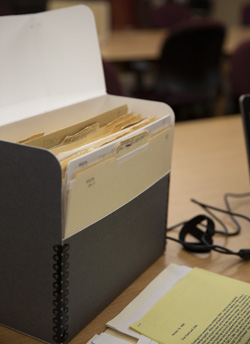Because Wheaton College is frequently associated with C.S. Lewis, whose papers are archived on campus at the Marion E. Wade Center, the popular English author is often humorously invoked as its patron saint. But the appellation could just as aptly fit Dr. Edward John Carnell, whose academic objectives, directly or indirectly, color the mission statements of nearly all accredited American evangelical liberal arts institutions. As theologian, philosopher and professor, Carnell played a crucial role in the development of contemporary evangelicalism, believing that conservative Christians too often failed to intellectually engage with the challenges posed by modernism. Widely networked among prominent American evangelicals of the mid-twentieth century, the movements of his extraordinary career can be seen in the various collections, books and files maintained by Wheaton Archives & Special Collections.
Continue readingHarold Lindsell
Finding “A Clear Voice”: 65 Years of Christianity Today
On October 15, 1956, 65 years ago today, Christianity Today published their first issue. Explaining the place of the new magazine in an editorial titled “Why Christianity Today?”, the editors stated, “evangelical Christianity needs a clear voice, to speak with conviction, and love, and to state its true position and its relevance to the world crisis.” Employing that clear voice to wide effect, this first printing was sent to more than 250,000 pastors, seminary students, and evangelical Christian leaders across the world.
An autographed copy of this first issue, as well as correspondence, board meeting minutes, financial reports, memos, photographs, audio tapes, and other material mostly relating to the founding of the magazine and a wide range of religious, social, and political issues can be found in Collection 8: Records of Christianity Today, held here at the Wheaton College Billy Graham Center Archives.

Introducing the Records of International Fellowship of Evangelical Students (IFES)
The summer months are a favorite season at the Wheaton College Billy Graham Center Archives, a noticeable shift from the marathon of the academic year to the sprint of summer research visits. This year, the manuscripts reading room is eerily dark and quiet, while dissertations, articles, monographs, documentaries, and other research projects wait on pause during the COVID-19 pandemic.

Providing access to collections, however, is only one of many archival tasks. Long before researchers can scroll through finding aids, dig through boxes, or submit duplication requests, collections must be processed—a meticulous procedure of arranging, describing, and preserving historical documents. Depending on staff resources and the size and physical condition of the materials, some processing jobs can require years of effort.
This silent summer in the manuscripts reading room provided one unanticipated benefit for archivists—uninterrupted time for processing—and allowed us to put the final processing touches on a significant new collection.
This August, the Wheaton College Billy Graham Center Archives is pleased to announce the opening of Collection 640: Records of the International Fellowship of Evangelical Students (IFES) for research.
Continue readingGetting Lost in the Archives: A Conversation with Dr. Amber Thomas Reynolds

This September, we sat down with Dr. Amber Thomas Reynolds—Wheaton College Grad School alumna and archives enthusiast—and plied her with questions about the challenges, joys, and adventures of archival research. A longtime patron of the Billy Graham Center Archives, Dr. Reynolds relied heavily on our resources for both her MA thesis at Wheaton College and PhD dissertation at the University of Edinburgh. Currently serving as a guest assistant professor at Wheaton College, Dr. Reynolds can be found in the history department, where she is teaching World History Since 1500 and US Pop Culture Since 1900 this semester.
Continue reading